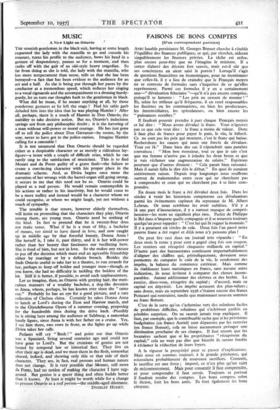MUSIC
A New Light on Ottavio
THE stoutish gentleman in the black suit, having at some length requested the lady with the mannlla to go and console his treasure, turns his profile to the audience, bows his head in a gesture of despondency, pauses so for a moment, and then stalks off with the gait of an old-style heavy tragedian. So far from doing as she is told, the lady with the mantilla, who has more temperament than sense, tells us that she has been betrayed—a fact that has been evident to the audience for an act and a half. As she is being put through her paces by the conductor at a tremendous speed, which reduces her singing to a vocal rigmarole and the accompaniment to a droning hurdy- gurdy, let us turn our thoughts back to the gentleman in black.
What did he mean, if he meant anything at all, by those ponderous gestures as he left the stage ? Had his sable garb deluded him into the idea that he was playing Hamlet ? After all, perhaps, there is a touch of Hamlet in Don Ottavio, the inability to take decisive action. But no, Ottavio's indecision springs not from any philosophic doubt ; it is the havering of a man without will-power or moral courage. He has just gone off to tell the police about Don Giovanni—he seems, by the way, never to have got to the police-station. Imagine Hamlet calling for a constable !
It is not unnatural that Don Ottavio should be regarded either as a despicable character or as merely a ridiculous lay- figure—a tenor with a couple of difficult arias, which he can rarely sing to the satisfaction of musicians. This is to find Mozart and da Ponte guilty of a grave fault—the failure to create a convincing character with his proper place in the dramatic scheme. And, as Elvira begins once more the narration of her wrongs with the barrel-organ still going strong, it occurs to me that this need not be so. Ottavio could be played as a real person. He would remain contemptible in his actions or rather in his inactivity, but he would cease to be a mere nullity and instead would be a character whom we could recognise, at whom we might laugh, yet not without a touch of sympathy.
The trouble is that tenors, however elderly themselves, will insist on pretending that the characters they play, Ottavio among them, are young men. Ottavio need be nothing of the kind. In fact to pretend that he is twenty-four does not make sense. What if he is a. man of fifty, a bachelor of means, too timid to have dared in love, and now caught up in middle age by that forceful beauty, Donna Anna ? She herself is, I take it, past thirty, and it is her will-power rather than her beauty that fascinates our vacillating hero. She is fond of him, but not in love. So she makes any excuse to put off the decision which must end an agreeable friendship either by marriage or by a definite breach. Besides she finds Ottavio useful to take her to a theatre, to run errands for her, perhaps to keep off bolder and younger men—though, as you know, she had no difficulty in tackling the boldest of the lot. Still it is better, if possible, to avoid such unpleasantness.
Let us imagine, then, an Ottavio with greying hair, the meti- culous manners of a wealthy bachelor, a dog-like devotion to Anna, whom, perhaps, he has known ever since she "came out." Probably he has an eye for a good picture, and a rare collection of Chelsea china. Certainly he takes Donna Anna to lunch at Lord's during the Eton and Harrow match, and to the Glyndebourne Opera of a summer evening, proposing for the hundredth time during the drive back. -Possibly he is sitting here among the audience at Salzburg, a somewhat lonely figure, since Anna is with her father on a cruise. Yes, I see him there, two rows in front, as the lights go up while Elvira takes her calls.
Pedants will cry " Bosh ! " and point out that Ottavio was a Spaniard, living several centuries ago and could not have gone to Lord's. But the creations of genius are not hound by temporal law or historical fact. They live on after their age is dead, and we meet them in the flesh, somewhat altered, indeed, and showing only this or that side of their character. They are, in fact, real persons and human nature does not change. It is very possible that Mozart, still more da Ponte, had no notion of making the character I have sug- gested. But genius is a queer thing and often builds better than it knows. At least it might be worth while for a change to present Ottavio as a real person—the middle-aged dilettante.
DYNELEY HUSSEY.










































 Previous page
Previous page